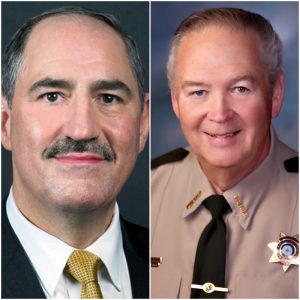By Adam Stone, SecurityMagazine.com
On October 1, 2017 a lone gunman fired down from the 32nd floor of the Mandalay Bay Hotel in Las Vegas, killings dozens of people attending a country music festival.
The first responder on the scene was a private security guard called to respond to suspicious activity in the shooter’s room. He was shot in the leg, and while he was able to notify hotel security via radio, he had no means to directly contact public safety. “As a consequence, a lot of people died that didn’t have to die,” said Tom M. Conley, president and CEO of Des Moines-based security consultancy The Conley Group.
He’s one of a growing number of security professionals calling for closer ties between private security and public safety. As security guards become more highly professionalized, they say, public safety professionals could leverage their on-scene awareness as a vital force multiplier, if interoperable communications were more readily available. (The topic is slated to be discussed at the upcoming Security 500 conference, Nov. 18 at the Ritz Carlton Pentagon City, Arlington, Va.)
The Case for Communication
After-Action Reports published by FEMA and the Clark County Fire Department and Las Vegas police cite numerous missteps in the Mandalay Bay response, and make a broad range of recommendations for the future. Yet these reports do not address what some in security consider to be a crucial gap: The lack of ready comms between private security and the public side.
In the past, public safety may have shied away from including security guards in the comms strategy, on the grounds that those guards were not sufficiently trained to be effective partners in an emergency.
“The law enforcement officer is someone we’ve hired. We know how they are going to react,” said Bill McCarthy, a former Des Moines police chief and retired Polk County Sheriff, who now advocates for greater interoperability. With increasing proficiency among security professionals, those old worries are less of a concern, he said.
Click here to read the rest of the story.
________________________________________________________________________________
Get certified and take your security career to the next level!
The International Foundation for Protection Officers (IFPO) is dedicated to providing meaningful and cost effective security training for security guards and protection officers.
We believe that education is a necessary and essential part of professional security training and the security officer’s background. IFPO serves individuals, security companies, and organizations that have their own private security staff. Our students and members benefit from the recognition and standing that the prestigious IFPO certification conveys.
LIKE and FOLLOW the IFPO on Facebook!
International Foundation for Protection Officers Mission Statement
Mission Statement Part I.
The International Foundation for Protection Officers provides professional learning opportunities for security practitioners, to impart the knowledge, skills, and competencies required to maximize job performance and enhance career potential.
Purpose: to make a positive difference in the quality of the participant’s job performance and elevate the professional status of students who partake of our learning opportunities.
Business: to supply committed security practitioners with a quality education to help achieve their highest potential and provide recognized accreditation for successful completion of educational goals.
Values: commitment, integrity, responsibility, and standards of excellence, provide the platform that supports our journey as we pursue our mission.
Vision Statement
Commitment to Excellence: To be the recognized center of excellence and primary provider of education and training products and services to the security industry.
Mission Statement Part II.
“The International Foundation for Protection Officers is committed to the support and professional development of protection officers and supervisors. Through advocacy, promoting training standards, and providing accessible training, education and certification opportunities, we seek to enhance their professional standing as well as increase and diversify the value of the vital services they provide.”



